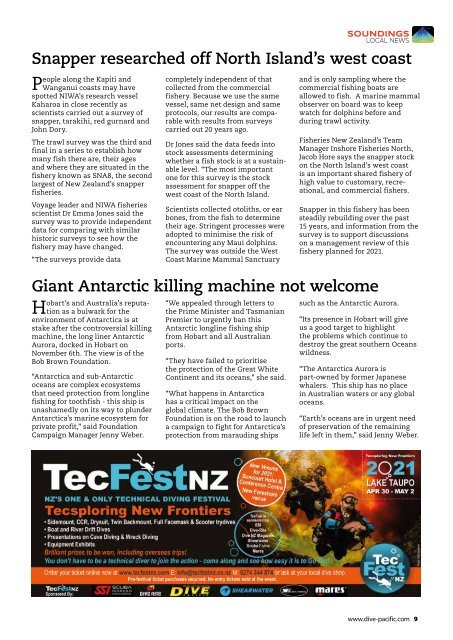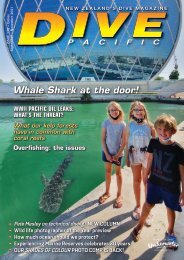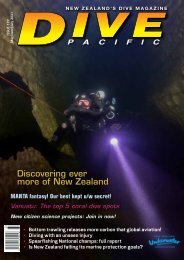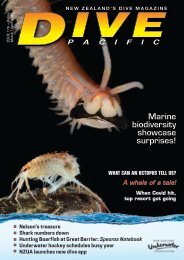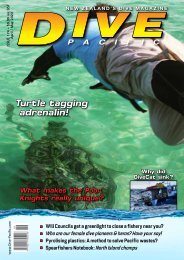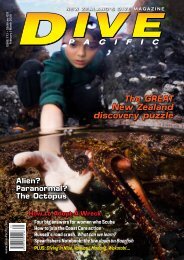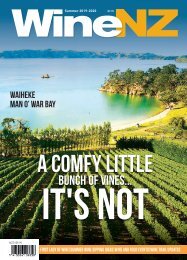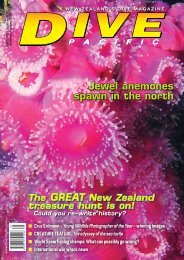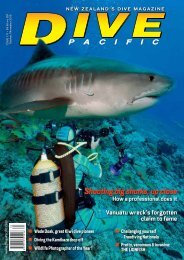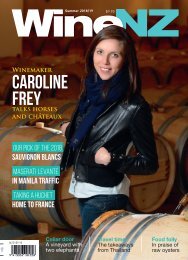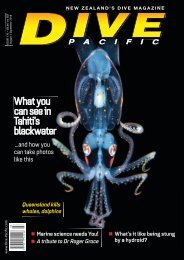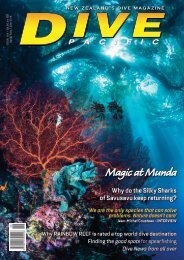Dive Pacific 175 Dec2020 Jan 2021
Dive Pacific, New Zealand's Dive Magazine , captures the best of diving in New Zealand and the Pacific. with adventures, top photos and expert technical advice
Dive Pacific, New Zealand's Dive Magazine , captures the best of diving in New Zealand and the Pacific. with adventures, top photos and expert technical advice
You also want an ePaper? Increase the reach of your titles
YUMPU automatically turns print PDFs into web optimized ePapers that Google loves.
SOUNDINGS<br />
LOCAL NEWS<br />
Snapper researched off North Island’s west coast<br />
People along the Kapiti and<br />
Wanganui coasts may have<br />
spotted NIWA’s research vessel<br />
Kaharoa in close recently as<br />
scientists carried out a survey of<br />
snapper, tarakihi, red gurnard and<br />
John Dory.<br />
The trawl survey was the third and<br />
final in a series to establish how<br />
many fish there are, their ages<br />
and where they are situated in the<br />
fishery known as SNA8, the second<br />
largest of New Zealand’s snapper<br />
fisheries.<br />
Voyage leader and NIWA fisheries<br />
scientist Dr Emma Jones said the<br />
survey was to provide independent<br />
data for comparing with similar<br />
historic surveys to see how the<br />
fishery may have changed.<br />
“The surveys provide data<br />
Hobart’s and Australia’s reputation<br />
as a bulwark for the<br />
environment of Antarctica is at<br />
stake after the controversial killing<br />
machine, the long liner Antarctic<br />
Aurora, docked in Hobart on<br />
November 6th. The view is of the<br />
Bob Brown Foundation.<br />
“Antarctica and sub-Antarctic<br />
oceans are complex ecosystems<br />
that need protection from longline<br />
fishing for toothfish - this ship is<br />
unashamedly on its way to plunder<br />
Antarctica’s marine ecosystem for<br />
private profit,” said Foundation<br />
Campaign Manager Jenny Weber.<br />
completely independent of that<br />
collected from the commercial<br />
fishery. Because we use the same<br />
vessel, same net design and same<br />
protocols, our results are comparable<br />
with results from surveys<br />
carried out 20 years ago.<br />
Dr Jones said the data feeds into<br />
stock assessments determining<br />
whether a fish stock is at a sustainable<br />
level. “The most important<br />
one for this survey is the stock<br />
assessment for snapper off the<br />
west coast of the North Island.<br />
Scientists collected otoliths, or ear<br />
bones, from the fish to determine<br />
their age. Stringent processes were<br />
adopted to minimise the risk of<br />
encountering any Maui dolphins.<br />
The survey was outside the West<br />
Coast Marine Mammal Sanctuary<br />
“We appealed through letters to<br />
the Prime Minister and Tasmanian<br />
Premier to urgently ban this<br />
Antarctic longline fishing ship<br />
from Hobart and all Australian<br />
ports.<br />
“They have failed to prioritise<br />
the protection of the Great White<br />
Continent and its oceans,” she said.<br />
“What happens in Antarctica<br />
has a critical impact on the<br />
global climate. The Bob Brown<br />
Foundation is on the road to launch<br />
a campaign to fight for Antarctica’s<br />
protection from marauding ships<br />
and is only sampling where the<br />
commercial fishing boats are<br />
allowed to fish. A marine mammal<br />
observer on board was to keep<br />
watch for dolphins before and<br />
during trawl activity.<br />
Fisheries New Zealand’s Team<br />
Manager Inshore Fisheries North,<br />
Jacob Hore says the snapper stock<br />
on the North Island’s west coast<br />
is an important shared fishery of<br />
high value to customary, recreational,<br />
and commercial fishers.<br />
Snapper in this fishery has been<br />
steadily rebuilding over the past<br />
15 years, and information from the<br />
survey is to support discussions<br />
on a management review of this<br />
fishery planned for <strong>2021</strong>.<br />
Giant Antarctic killing machine not welcome<br />
such as the Antarctic Aurora.<br />
“Its presence in Hobart will give<br />
us a good target to highlight<br />
the problems which continue to<br />
destroy the great southern Oceans<br />
wildness.<br />
“The Antarctica Aurora is<br />
part-owned by former Japanese<br />
whalers. This ship has no place<br />
in Australian waters or any global<br />
oceans.<br />
“Earth’s oceans are in urgent need<br />
of preservation of the remaining<br />
life left in them,” said Jenny Weber.<br />
www.dive-pacific.com 9


